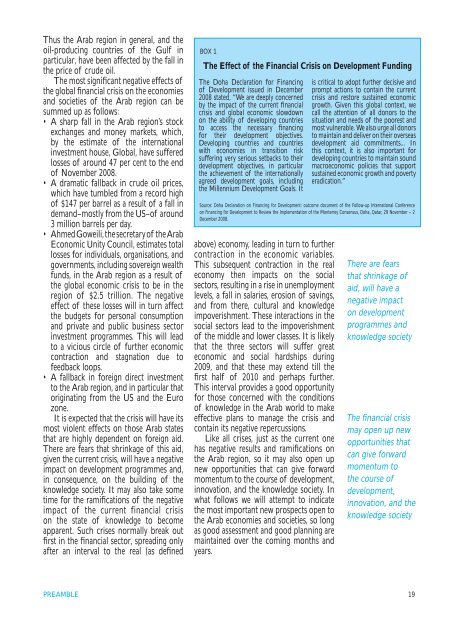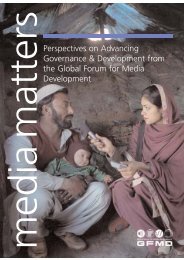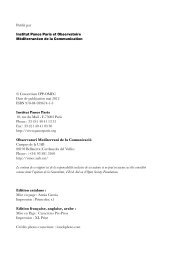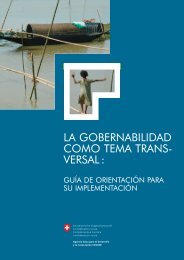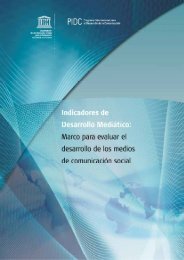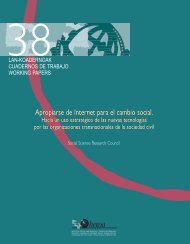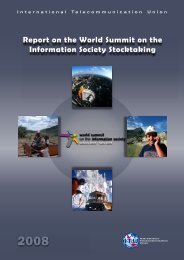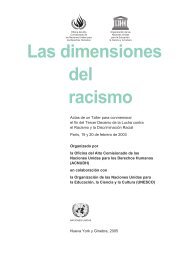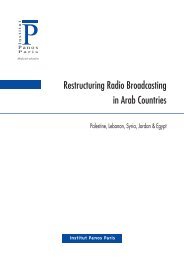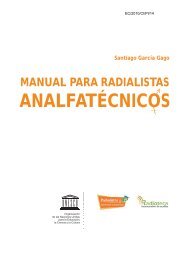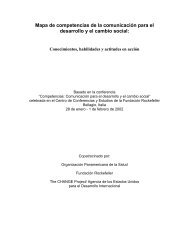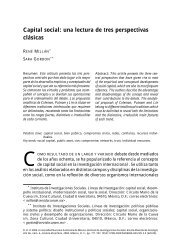Arab Knowledge Report 2009
Arab Knowledge Report 2009
Arab Knowledge Report 2009
- No tags were found...
Create successful ePaper yourself
Turn your PDF publications into a flip-book with our unique Google optimized e-Paper software.
Thus the <strong>Arab</strong> region in general, and theoil-producing countries of the Gulf inparticular, have been affected by the fall inthe price of crude oil.The most significant negative effects ofthe global financial crisis on the economiesand societies of the <strong>Arab</strong> region can besummed up as follows:• A sharp fall in the <strong>Arab</strong> region’s stockexchanges and money markets, which,by the estimate of the internationalinvestment house, Global, have sufferedlosses of around 47 per cent to the endof November 2008.• A dramatic fallback in crude oil prices,which have tumbled from a record highof $147 per barrel as a result of a fall indemand–mostly from the US–of around3 million barrels per day.• Ahmed Goweili, the secretary of the <strong>Arab</strong>Economic Unity Council, estimates totallosses for individuals, organisations, andgovernments, including sovereign wealthfunds, in the <strong>Arab</strong> region as a result ofthe global economic crisis to be in theregion of $2.5 trillion. The negativeeffect of these losses will in turn affectthe budgets for personal consumptionand private and public business sectorinvestment programmes. This will leadto a vicious circle of further economiccontraction and stagnation due tofeedback loops.• A fallback in foreign direct investmentto the <strong>Arab</strong> region, and in particular thatoriginating from the US and the Eurozone.It is expected that the crisis will have itsmost violent effects on those <strong>Arab</strong> statesthat are highly dependent on foreign aid.There are fears that shrinkage of this aid,given the current crisis, will have a negativeimpact on development programmes and,in consequence, on the building of theknowledge society. It may also take sometime for the ramifications of the negativeimpact of the current financial crisison the state of knowledge to becomeapparent. Such crises normally break outfirst in the financial sector, spreading onlyafter an interval to the real (as definedBOX 1The Effect of the Financial Crisis on Development FundingThe Doha Declaration for Financingof Development issued in December2008 stated, “We are deeply concernedby the impact of the current financialcrisis and global economic slowdownon the ability of developing countriesto access the necessary financingfor their development objectives.Developing countries and countrieswith economies in transition risksuffering very serious setbacks to theirdevelopment objectives, in particularthe achievement of the internationallyagreed development goals, includingthe Millennium Development Goals. Itabove) economy, leading in turn to furthercontraction in the economic variables.This subsequent contraction in the realeconomy then impacts on the socialsectors, resulting in a rise in unemploymentlevels, a fall in salaries, erosion of savings,and from there, cultural and knowledgeimpoverishment. These interactions in thesocial sectors lead to the impoverishmentof the middle and lower classes. It is likelythat the three sectors will suffer greateconomic and social hardships during<strong>2009</strong>, and that these may extend till thefirst half of 2010 and perhaps further.This interval provides a good opportunityfor those concerned with the conditionsof knowledge in the <strong>Arab</strong> world to makeeffective plans to manage the crisis andcontain its negative repercussions.Like all crises, just as the current onehas negative results and ramifications onthe <strong>Arab</strong> region, so it may also open upnew opportunities that can give forwardmomentum to the course of development,innovation, and the knowledge society. Inwhat follows we will attempt to indicatethe most important new prospects open tothe <strong>Arab</strong> economies and societies, so longas good assessment and good planning aremaintained over the coming months andyears.is critical to adopt further decisive andprompt actions to contain the currentcrisis and restore sustained economicgrowth. Given this global context, wecall the attention of all donors to thesituation and needs of the poorest andmost vulnerable. We also urge all donorsto maintain and deliver on their overseasdevelopment aid commitments... Inthis context, it is also important fordeveloping countries to maintain soundmacroeconomic policies that supportsustained economic growth and povertyeradication.”Source: Doha Declaration on Financing for Development: outcome document of the Follow-up International Conferenceon Financing for Development to Review the Implementation of the Monterrey Consensus, Doha, Qatar, 29 November – 2December 2008.There are fearsthat shrinkage ofaid, will have anegative impacton developmentprogrammes andknowledge societyThe financial crisismay open up newopportunities thatcan give forwardmomentum tothe course ofdevelopment,innovation, and theknowledge societyPREAMBLE19


